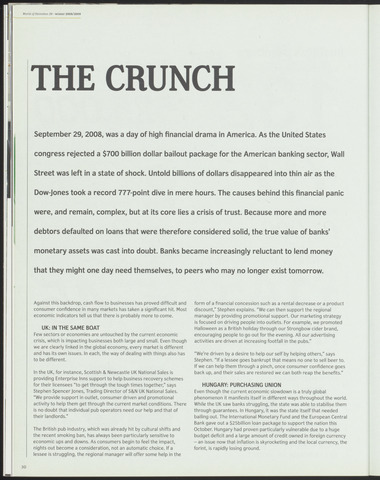September 29, 2008, was a day of high financial drama in America. As the United States
congress rejected a $700 billion dollar bailout package for the American banking sector, Wall
Street was left in a state of shock. Untold billions of dollars disappeared into thin air as the
Dow-Jones took a record 777-point dive in mere hours. The causes behind this financial panic
were, and remain, complex, but at its core lies a crisis of trust. Because more and more
debtors defaulted on loans that were therefore considered solid, the true value of banks'
monetary assets was cast into doubt. Banks became increasingly reluctant to lend money
that they might one day need themselves, to peers who may no longer exist tomorrow.
World of Heineken 39 - winter 2008/2009
THE CRUNCH
Against this backdrop, cash flow to businesses has proved difficult and
consumer confidence in many markets has taken a significant hit. Most
economic indicators tell us that there is probably more to come.
UK: IN THE SAME BOAT
Few sectors or economies are untouched by the current economic
crisis, which is impacting businesses both large and small. Even though
we are clearly linked in the global economy, every market is different
and has its own issues. In each, the way of dealing with things also has
to be different.
In the UK, for instance, Scottish Newcastle UK National Sales is
providing Enterprise Inns support to help business recovery schemes
for their licensees "to get through the tough times together," says
Stephen Spencer Jones, Trading Director of S&N UK National Sales.
"We provide support in outlet, consumer driven and promotional
activity to help them get through the current market conditions. There
is no doubt that individual pub operators need our help and that of
their landlords."
The British pub industry, which was already hit by cultural shifts and
the recent smoking ban, has always been particularly sensitive to
economic ups and downs. As consumers begin to feel the impact,
nights out become a consideration, not an automatic choice. If a
lessee is struggling, the regional manager will offer some help in the
form of a financial concession such as a rental decrease or a product
discount," Stephen explains. "We can then support the regional
manager by providing promotional support. Our marketing strategy
is focused on driving people into outlets. For example, we promoted
Halloween as a British holiday through our Strongbow cider brand,
encouraging people to go out for the evening. All our advertising
activities are driven at increasing footfall in the pubs."
"We're driven by a desire to help our self by helping others," says
Stephen. "If a lessee goes bankrupt that means no one to sell beer to.
If we can help them through a pinch, once consumer confidence goes
back up, and their sales are restored we can both reap the benefits."
HUNGARY: PURCHASING UNION
Even though the current economic slowdown is a truly global
phenomenon it manifests itself in different ways throughout the world.
While the UK saw banks struggling, the state was able to stabilise them
through guarantees. In Hungary, it was the state itself that needed
bailing out. The International Monetary Fund and the European Central
Bank gave out a $25billion loan package to support the nation this
October. Hungary had proven particularly vulnerable due to a huge
budget deficit and a large amount of credit owned in foreign currency
- an issue now that inflation is skyrocketing and the local currency, the
forint, is rapidly losing ground.
30

